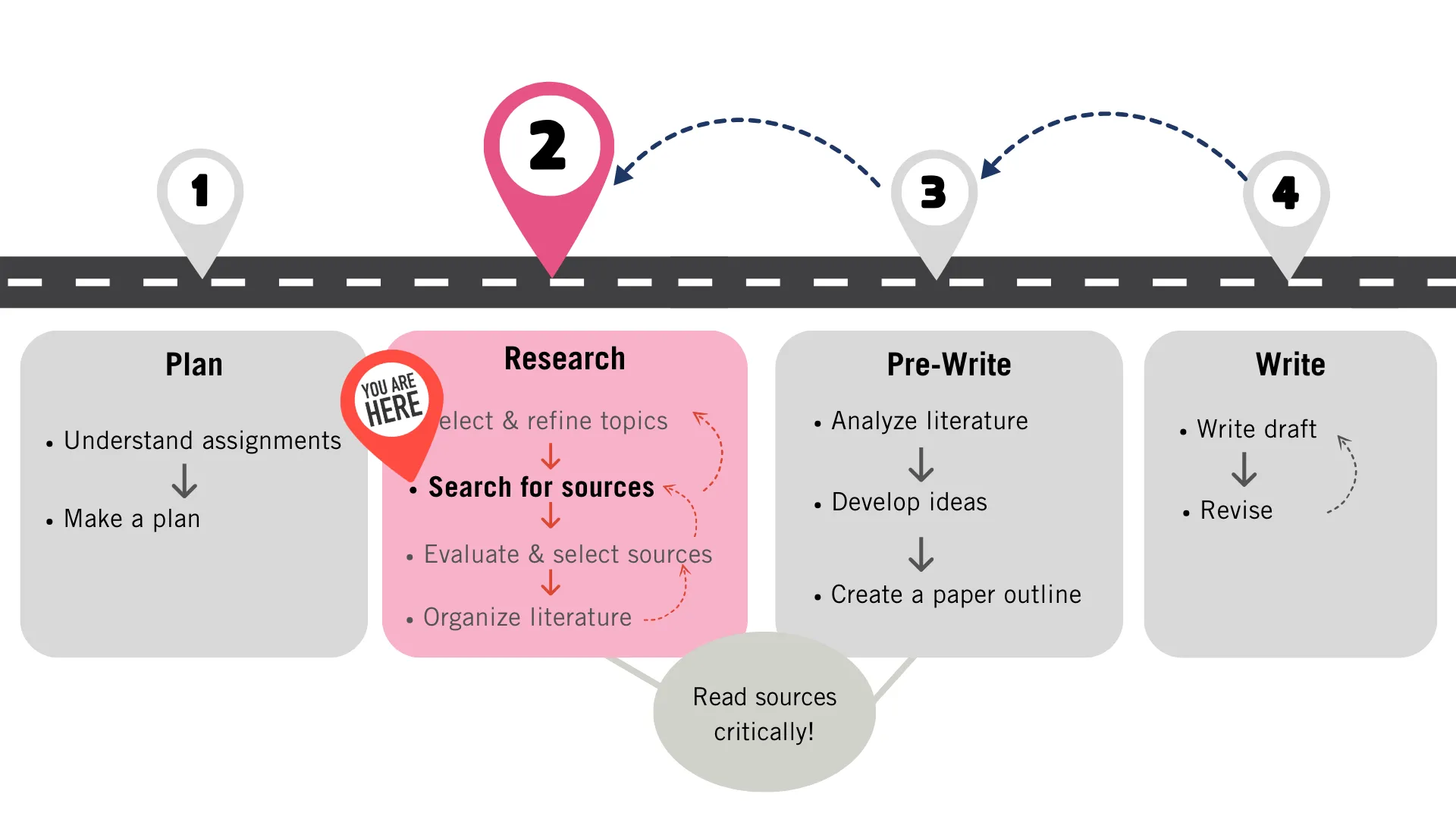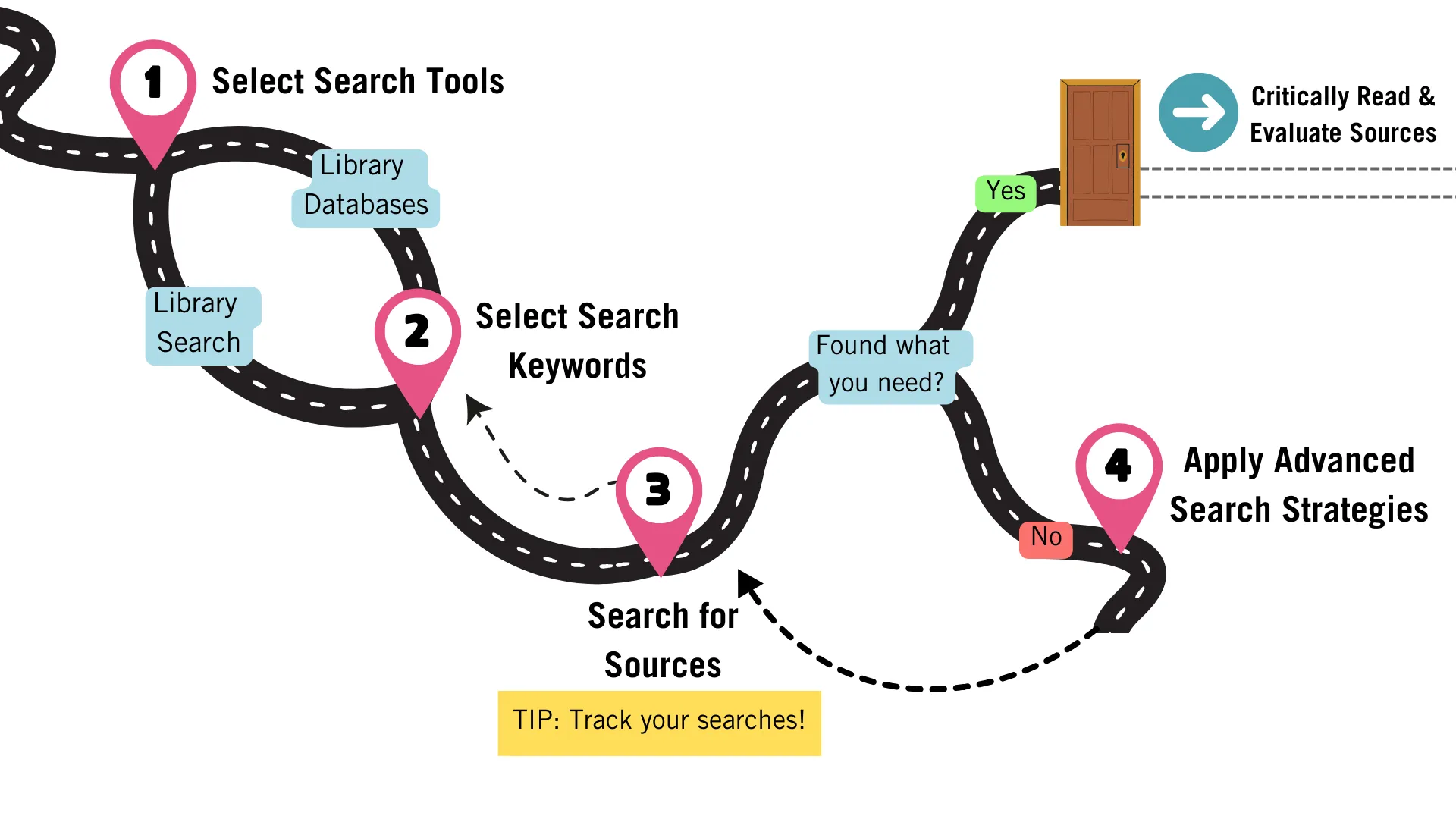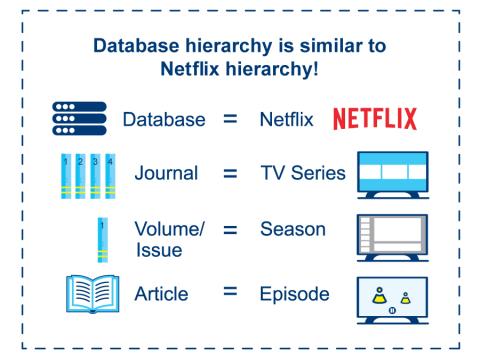How to Find Sources for Assignments
This Resource Page will help you:
- Understand why you should search for sources through the library system .
- Search for appropriate sources that fit your assignment requirements.
- Learn strategies to make your search more efficient.
Before You Start
Most of the content on this page has been summarized based on a Quercus self-paced learning module developed by the University of Toronto Libraries titled Library Research Skills.

What are Scholarly and Peer-reviewed Sources?
You may receive assignment instructions that require you to find sources labelled as “scholarly”, or “academic”, or “peer-reviewed”. You might wonder what these terms mean:
Scholarly or academic sources are materials that have been created by experts in a particular field of study. They are characterized by their depth of research, rigorous analysis, and adherence to high academic standards. These resources contribute to scholarly discussions and are often published in journals, books, or conference proceedings. Examples include research articles, academic monographs, and conference papers.
Peer-reviewed sources are scholarly materials that have undergone a thorough evaluation process by experts in the same field before publication. This evaluation ensures the quality, accuracy, and credibility of the content. Peer-reviewed resources are essential for academic research as they provide reliable information that has been validated by peers with expertise in the subject area. For a deeper look at the peer review process check Peer Review from the University of Toronto Libraries .
Source Searching Roadmap
This resource is designed to guide you in efficiently locating the appropriate sources for your assignments. The roadmap below gives you an overview of the steps involved in searching for sources. Each step is then explained in detail in the individual sections of this resource page.

1. Select Suitable Search Tools
You might wonder why Google isn`t a suitable search tool. Here are some reasons:
- Although Google can help you start searching for information, you should follow the assignment instructions if they require you to search for scholarly sources.
- There is no guarantee that the sources you find on Google are credible, or that they were written by actual experts in your field. Anyone can publish anything outside of scholarly books and articles!
- As graduate students, you should be using multiple search tools in conjunction with each other, including databases and U of T’s Library search. You’ll find more information about this below.
Most scholarly sources you will be requested to search are journal articles and scholarly books. You can learn more about other types of sources here: Exploring sources: Library Research Skills (utoronto.ca)
Types of search tools
Library Search: The LibrarySearch is the main search box on the University of Toronto Libraries websites. You will need to log in with your UTORiD to view most sources you find. Watch this U of T Libraries video for basic instructions on how to search the general library online system.
Subject-specific databases: Databases help you search for articles more efficiently. Most databases specialize in a specific subject and have specific features that let you find the best sources for your discipline faster.
Watch the OISE Library’s video below (2mins 45sec) to learn about it.
Databases are storehouses of articles that have been collected together in one place, often because of their common subject focus; for example, an education database such as ERIC will only index (i.e., contain records) from journals in the field of education. You'll find your results are -- hopefully! -- more relevant to your research interests, so there's less need to sift through a scattered, drawn-out results list. You can search databases by keywords, article title, journal title, and/or author, and use various limiters (e.g., date, language, topics).
The database hierarchy is similar to the Netflix hierarchy, with journals = TV series, volume/issue = season, and article = episode.

The OISE library has created a page with several education and psychology databases. Starting from the OISE Library main page, you can click on Education Databases and use the filters to choose the database that better fits your topic. Watch this short video to learn more about Education Databases.
The OISE Library has created library research modules for each OISE department. The modules are designed to support self-directed learning on the fundamentals of library searching as well as specific databases and resources customized to the different research areas in each of OISE's four departments. These modules are hosted in Quercus on a self-enroll basis.
- Library Resources for Applied Psychology and Human Development(APHD)
- Library Resources for Curriculum, Teaching and Learning (CTL)
- Library Resources for Leadership, Higher and Adult Education(LHAE)
- Library Resources for Social Justice Education (SJE)
- Library Resources for Master of Teaching (Research 1/CTL7006)
2. Select Search Keywords
What are “keywords”?
Keywords are individual words or concise phrases representing the core concepts of a research topic or document. In academia, they help categorize and locate information. Keyword searching is easy but imprecise.
For example, if you want to write an assignment on second language learning for adult learners, relevant keywords could be:
Second Language Acquisition; Adult Learners; Language Learning Strategies; Communicative Approach; Language Proficiency; Cultural Competence; Pedagogical Techniques, etc.
How to select appropriate keywords
- Brainstorm synonyms and related terms to enhance your search strategy. Check out the video ‘How do I Brainstorm Synonyms and Related Terms to Enhance my Search Strategy? from the OISE Library.
- Use a planning worksheet to brainstorm keywords for core concepts and related terms.
3. Search for Sources
Once you have identified a few appropriate keywords for your topic, start using them in the database of your choice and check your search results.
Use Database Filters: After performing an initial search, use filters available in the database to refine your results. Filtering by peer-reviewed status, publication date, or subject area can help you sift through results more effectively and find sources that are most relevant to your academic needs.
Adjust Search Scope: If your initial search yields too many irrelevant results, consider narrowing your search to specific fields within the database, such as the article title, abstract, or author keywords, rather than a full-text search. Conversely, if you're finding too few results, expanding your search to include full text might uncover hidden gems.
Keep Track of Your Searches: You will likely perform multiple searches with different keywords. Saving and tracking your searches will therefore be useful. You can use this worksheet.
4. Apply Advanced Search Strategies
Research is an iterative process. If your initial searches don't yield the desired results, revisit your search terms and strategies. See below advanced search strategies to help you find the sources you need.
Phrase searching is a type of search command that can be used to narrow search results. When your keyword is made of two or more words, search the phrase in quotations, e.g., “elementary school” or “post-secondary education” to search for separate words as an exact phrase.
Truncation allows you to expand your results by searching for multiple endings of the same root word using an asterisk*.
Example: Search canad* to find Canada, Canadian, or Canadians.
Watch this video (external page) to learn more about truncation.
Still not sure what all of these strategies look like in practice? The video tutorial below shows you how to use search strategies to find sources in Education Source, one of the main education databases.
5. Next Steps
Once you have found some potentially useful sources, you will need to take a closer look and and evaluate whether they are relevant to your topic, credible and useful for your arguments and ideas. To learn more about critical reading, check our resource page on How to Read Academic Articles. To learn more about evaluating sources, read our resource page How to Evaluate and Select Literature.
As you read, evaluate and go through your selection process, you will also need to save and organize your sources (i.e., the documents, their citations, and the relevant content) to easily and quickly retrieve the information you need. To learn more about organizing your sources, read our resource page on how to organize literature.
Help & Additional Resources
Additional Resources
- Library Resources for Applied Psychology and Human Development(APHD)
- Library Resources for Curriculum, Teaching and Learning (CTL)
- Library Resources for Leadership, Higher and Adult Education(LHAE)
- Library Resources for Social Justice Education (SJE)
- Library Resources for Master of Teaching (Research 1/CTL7006)
- OISE Library Research Skills Quercus Course
- OISE Library video tutorials
- Education Studies Research Guide
